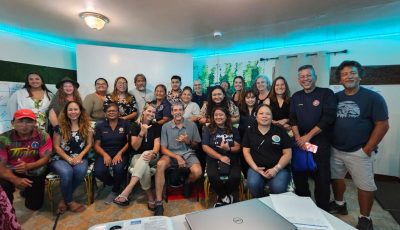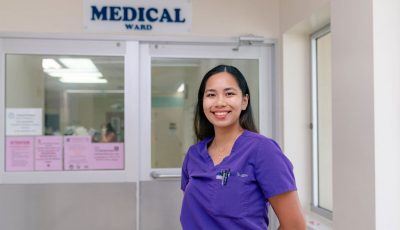CHCC reports 2 COVID-related deaths
The CNMI reported yesterday that it recorded two more COVID-19-related deaths, raising the CNMI’s grim toll to 37 since the pandemic began.
Yesterday’s news release from the Commonwealth Healthcare Corp. stated that the Governor’s COVID-19 Task Force and CHCC have confirmed the CNMI’s 36th and 37th COVID-19-related deaths.
The news release did not release further details of these latest fatalities, as per standard CHCC procedure.
Also, as of yesterday, July 25, 2022, CHCC said there are three individuals hospitalized as a result of COVID-19.
From this report’s period of July 17 – 23, 2022, there were five new hospitalizations due to COVID-19.
As for new infections, CHCC reported that 173 more individuals have been confirmed positive for COVID-19 from July 17 to 23, 2022, bringing the CNMI total to 12,573 cases since March 28, 2020; two were identified before July 17, 2022.
Of the recently identified cases, nine were identified on July 17 (one on Tinian); 55 on July 18; 20 on July 19; 32 on July 20 (four on Tinian); 22 on July 21 (one on Tinian); 17 on July 22 (two on Tinian); and 18 on July 23 (three on Tinian).
With this uptick in community cases, the CNMI remains at COVID-19 Community Level Medium. The CNMI has been at the “Medium” Level since the latter part of June this year.
As of July 25, 2022, a total of 24,202 COVID-19 additional/booster vaccine shots have been administered; of the eligible population, 52.8% have received an additional dose. The vaccination rate is calculated using the 2020 Census population estimates for the CNMI and includes the eligible 5-years-old and older population. A correction has been made to show the accurate percentage of those eligible who have received an additional dose.
A total of 2,338 COVID-19 tests were conducted from July 17 to 23, 2022:
• 74 on July 17, 2022
• 548 on July 18, 2022
• 425 on July 19, 2022
• 107 on July 20, 2022
• 421 on July 21, 2022
• 577 on July 22, 2022
• 186 on July 23, 2022
Of the total number of cases that have been identified in the CNMI, as of July 23, 2022, there have already been 12,429 recoveries; 107 active cases; and 37 COVID-19-related deaths
The next CHCC report will be issued around Aug. 1, 2022.
Guidelines for residents
While we are in COVID-19 Community Level Medium:
• Wear a mask based on your personal preference, informed by your personal level of risk
• If you are immunocompromised or have a high risk for severe disease
– Talk to your healthcare provider about whether you need to wear a mask and take other precautions (e.g., testing)
– Have a plan for rapid testing if needed (e.g., having home tests or knowing how to access testing)
– Talk to your health care provider about whether you are a candidate for treatments like oral antivirals, pre-exposure prophylaxis (PrEP), and monoclonal antibodies
• If you have household or social contact with someone at high risk for severe disease:
– Consider self-testing to detect infection before contact
– Consider wearing a mask when indoors with them
• Stay up to date with COVID-19 vaccines and boosters
• Maintain improved ventilation throughout indoor spaces whenever possible
• Follow CDC recommendations for isolation and quarantine, including getting tested if you are exposed to COVID-19 or have symptoms of COVID-19.
Individuals who test positive for COVID-19 should stay home and isolate when they are sick (except to get medical care), even if they do not have symptoms; rest; stay hydrated; can take over-the-counter medicines, such as acetaminophen or ibuprofen, to relieve symptoms; and live COVID-19 safe.
Residents of the CNMI who test positive for COVID-19 may be eligible for treatment by calling (670) 234-8950, ext. 5068 or reporting their positive test result online at www.staysafecnmi.com/self-reporting as soon as possible after testing positive. Residents requesting COVID-19 treatment should fill out the medical questionnaire in the form to get assessed as soon as possible. Reporting a positive test result online also allows residents to obtain a certificate of quarantine completion, which employers/individuals may use as documentation of a positive test result.
Individuals experiencing COVID-19 symptoms should stay home (except to get medical care or get tested for COVID-19) and live COVID-19 safe. Other options include seeing their health care provider. For a guidebook on how to live COVID-19 safe, visit www.staysafecnmi.com/livecovidsafe.
CHCC continues to encourage the community to get vaccinated if they have not done so, or get their booster shot if they are eligible to help prevent severe illness, hospitalization, or death. People considered high risk (e.g., history of diabetes, high blood pressure, heart disease, obesity, or cancer, or over the age of 65), immunocompromised persons, or unvaccinated individuals are at risk of serious illness from COVID-19. Unvaccinated individuals spread the virus at a higher rate than vaccinated individuals, thereby increasing the spread and risk of serious illness toward other unvaccinated individuals.
Stay up to date with your COVID-19 vaccination, which includes additional doses for individuals who are immunocompromised or booster doses for those who are eligible. Register for COVID-19 vaccines at www.vaccinatecnmi.com, or call (670) 236-8745.
COVID-19 vaccines are now available for individuals aged 6 months – 4 years. Individuals aged 18 or older are eligible to avail of a booster shot; 5- to 17-year-olds can avail of a Pfizer-BioNTech booster shot. Individuals aged 50 or older or certain individuals who are immunocompromised can avail of a 2nd booster shot.
Data show that vaccine effectiveness against COVID-19 infection is waning after the primary series, but protection remains high against severe disease and hospitalization.
Free COVID-19 testing is available by registering at https://covidtesting.chcc.health.
While you wait to get tested or for your test results, stay at home as much as possible and limit your contact with others. Live COVID-19 safe: wear your mask; wash your hands; watch your distance; avoid crowds and poorly ventilated spaces; cover coughs and sneezes; clean and disinfect high touch surfaces daily; be alert for symptoms daily; and get tested for COVID-19. (PR)



























